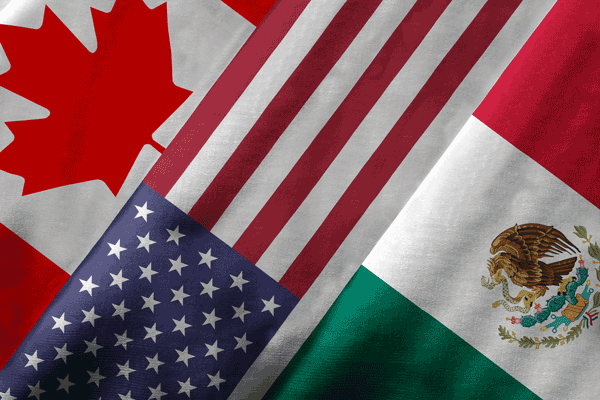
To celebrate the first anniversary of the U.S.-Mexico-Canada Agreement (USMCA), the Woodrow Wilson Center livestreamed a conversation with the trade ministers of the three nations on June 30. A recording of the livestream is available at www.wilsoncenter.org/event/usmca-one.
The keynote speakers were U.S. Trade Representative Katherine Tai; Mexico Secretary of Economy Tatiana Clouthier Carrillo; and Mary Ng, Canada Minister of Small Business, Export Promotion and International Trade.
The California Chamber of Commerce actively supported the creation of the USMCA, successor to the North American Free Trade Agreement (NAFTA), as a necessary modernization that recognizes the impacts of technology on the economies of the United States, Mexico and Canada.
The three nations comprise more than 490 million people (6.5% of the world’s population), a $26 trillion gross domestic product (GDP) (18.3% of world GDP), and $6 trillion in trade (nearly 16% of global trade).
Due to California’s position as a global leader in international trade, the priorities of the USMCA are important to the CalChamber’s members and the overall economic health of the state.
‘USMCA at One’
During the discussion on June 30, participants pointed to the USMCA as a model for future trade agreements and highlighted its strong labor and environmental provisions.
Examples cited of innovations made possible through the trilateral connections fostered by the USMCA included work on ventilation systems and zero-emission vehicles.
Speakers also highlighted the importance of the revised dispute settlement features in the USMCA because of the ongoing discussion on issues among the three nations.
Ambassador Tai commented that work on the agreement will never be finished because “the agreement is about relationships and relationships are dynamic.”
Others commented that the success of the trade partnership will depend in part on how the three nations work through their differences.
Speakers were optimistic that the USMCA will enable the three nations to bounce back from the pandemic in an even stronger economic position.
USMCA Benefits
The USMCA has leveled the playing field for U.S. workers and helped the United States become more independent while expanding access for U.S. dairy, chicken, egg, and turkey products to Canadian markets.
The agreement brought good jobs back to the United States and increased paychecks for U.S. workers which is vital for the nation’s economic recovery coming out of the pandemic. Besides proving to be a win for U.S. workers and small businesses, the USMCA shows that bipartisanship is critical in renewing trade programs and establishing new trade agreements.
Mexico has remained the United States’ second largest export market since 1995, with a total value of $212.67 billion in 2020. Today, Mexico stands as the United States’ largest trading partner, with a trade equivalent to $208.6 billion between January and April. Mexico is the first or second largest trading partner for 27 American states. Mexico continues to be California’s No. 1 export market, purchasing 15.4% of all California exports.
The United States and Canada enjoy the largest bilateral trade and investment relationship in the world. In 2020, two-way trade in goods between Canada and the United States topped $525.53 billion. Exports to Canada were $255 billion, making it the largest export destination for the United States. Canada is California’s second largest export market, purchasing 10.19% of all California exports.
For more information, visit the CalChamber trading partner portals for Mexico and Canada or the web page on the USMCA.

